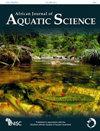马拉维大象沼泽-第3部分:应用生态社会模型评估管理生态状况的选择
IF 1
4区 环境科学与生态学
Q3 MARINE & FRESHWATER BIOLOGY
引用次数: 3
摘要
2016年,马拉维政府准备了一份申请,要求授予夏尔河上的大象沼泽拉姆萨尔湿地地位。作为支持该申请的一部分,并帮助指导最终的管理计划,为沼泽建立了生态社会整体环境流量评估模型DRIFT。其目的是预测沼泽对不断变化的水和沉积物流入情况的反应,以及对其自然资源的不同收获程度的反应,以便确定对维持其生物多样性的威胁和可行的选择。漂移评估的结果为拉姆sar的应用和随后制定管理计划提供了三个主要的指导要点。首先,研究表明,沼泽对流入的水和沉积物的短期变化具有相当的弹性,在其历史上经历了这两方面的重大波动,并且能够从极端干旱时期恢复生物多样性。其次,生物多样性的保护工作应集中在中部、东部和南部地区,因为这些地区比其他地区更容易受到水量减少的影响。第三,限制人们进入沼泽的某些部分,特别是东部、中部和南部的核心地区,可以显著改善其整体状况,增加其许多资源,提高其对气候变化的适应能力。在评估的通道限制中,如果停止所有进入中部地区的通道,并且将东部和南部地区的通道减少到2014年基线水平的50%,将实现对沼泽生态完整性的最大效益。本文章由计算机程序翻译,如有差异,请以英文原文为准。
The Elephant Marsh, Malawi – Part 3: the application of an eco-social model to assess options for managing ecological status
In 2016, an application was prepared by the Malawian government for the Elephant Marsh on the Shire River to be granted RAMSAR status. As part of the support for that application and to help guide the resulting management plan, the eco-social holistic environmental flow assessment model DRIFT was set up for the Marsh. The aim was to predict the response of the Marsh to scenarios of changing water and sediment inflows, and to different levels of harvesting of its natural resources, in order to identify threats to and viable options for sustaining its biodiversity. The results of the DRIFT assessment provided three main points of guidance for the RAMSAR application and the subsequent development of a management plan. First, it was shown the Marsh has been fairly resilient to short-term changes in the inflows of water and sediments, having endured significant fluctuations in both in its history, and was able to recover in terms of biodiversity from extreme dry periods. Second, it was revealed that conservation efforts to protect biodiversity should concentrate on the central, eastern and southern areas, as they were less vulnerable to decreases in water flows than the other areas of the Marsh. Third, restricting access to some parts of the Marsh, in particular the core eastern, central and southern areas, could markedly improve its overall condition, increase many of its resources and improve its resilience to Climate Change. Of the access restrictions assessed, the greatest benefit to the ecological integrity of the Marsh would be achieved if all access to the central area was stopped, and if access to the eastern and southern areas was reduced to 50% of the 2014 baseline levels.
求助全文
通过发布文献求助,成功后即可免费获取论文全文。
去求助
来源期刊

African Journal of Aquatic Science
MARINE & FRESHWATER BIOLOGY-
CiteScore
3.90
自引率
7.10%
发文量
31
审稿时长
>12 weeks
期刊介绍:
The African Journal of Aquatic Science is an international journal devoted to the study of the aquatic sciences, covering all African inland and estuarine waters. The Journal publishes peer-reviewed original scientific papers and short articles in all the aquatic science fields including limnology, hydrobiology, ecology, conservation, biomonitoring, management, water quality, ecotoxicology, biological interactions, physical properties and human impacts on African aquatic systems.
 求助内容:
求助内容: 应助结果提醒方式:
应助结果提醒方式:


